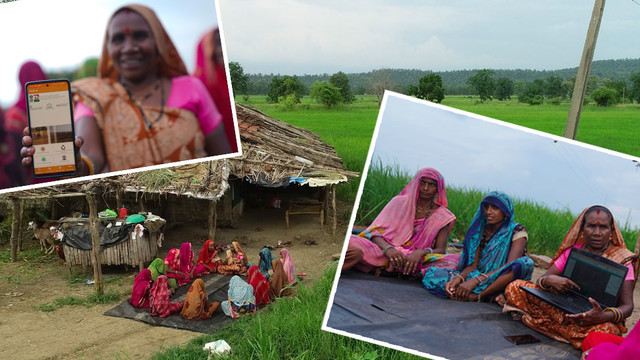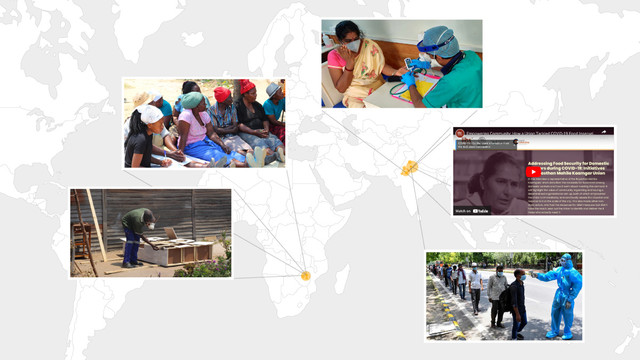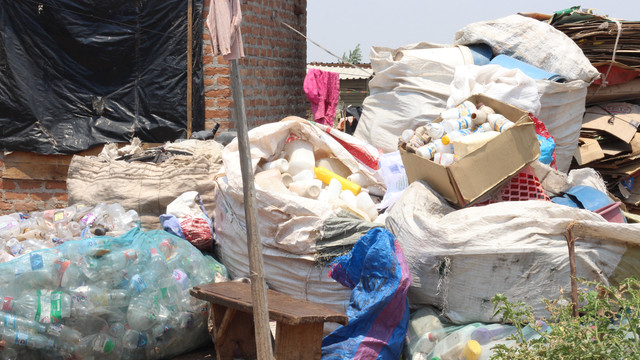Lessons from the pandemic: recommendations for urban stakeholders in Harare
A workshop in Harare, Zimbabwe outlined key recommendations from research into the challenges faced by low-income residents in informal settlements during the COVID-19 pandemic.

Stakeholders discuss the impact of COVID-19 and lessons learned at a workshop in Harare, Zimbabwe (Photo: KnowYourCityTv Zimbabwe (KYCTv Zimbabwe)
The COVID Collective research platform is a global research initiative seeking to generate rapid, collaborative social science evidence to inform decision-making on some of the most pressing development challenges related to COVID-19.
At an international level, the research is led and coordinated by the Institute of Development Studies in the UK. In Harare, Dialogue on Shelter Trust (DoS), in partnership with the Zimbabwe Homeless People’s Federation and Zimbabwe Young Peoples’ Federation, bring their understanding of the impact of disasters on low-income communities and other disadvantaged groups, and have used their experience to propose inclusive policy and programming responses.
The first round of research was conducted in 2021, which contributed to understanding the challenges faced by low-income residents in informal settlements and their ability to access critical COVID-19 response products and services.
The second and current phase (which started on 1 June 2022) is focusing on identifying any changes that have increased inclusion of disadvantaged groups and to understand the roles of stakeholders influencing this inclusion agenda. In doing so, the research is specifically keen to understand and derive lessons for state and non-state actors to improve social protection; building more equitable systems and better prepare for further shocks.
Communities are increasingly playing a more important role in disaster management, including being first responders in periods of shocks, and this research has sought evidence towards unlocking urban social movements’ potential to improve disaster responses.
The second phase also seeks to understand the impacts of disasters on those living and working informally in Harare. Furthermore, the research prioritises the uptake of findings with stakeholders which include grassroots communities, local and central government, non-state actors and policymakers.
A stakeholder engagement workshop was held on 13 June 2023 at the Holiday Inn Hotel, Harare. Participants included City of Harare officials from various departments (monitoring and evaluation, health, urban planning and water departments), district officers, non-governmental organisations and community representatives.
The workshop aimed to:
- Disseminate research key findings and proposed policy recommendations
- Create steps or build evidence to inform more equitable policy and programming responses, and
- Prioritise key findings emerging from the research, linked to COVID-19 impacts and responses in informal settlements.
Workshop agenda
Mr Msoni (City of Harare) led the welcoming remarks session, followed by a participant introductory session.
First speaker: Shadreck Tondori, Zimbabwe Homeless People’s Federation
Mr Tondori gave a presentation that highlighted the major objectives of the research and background of the research.
He highlighted the following question to be the major drive behind the workshop:
- Did COVID-19 affect us the same?
- What are we doing in preparation of the next disaster or pandemic as a collective?
- Resource mobilisation - how can it be done better?
Second speaker: Evans Banana, Dialogue on Shelter
Mr Banana presented the research objectives and the workshop’s expected outcomes. The research objectives are to:
- Analyse state and non-state interventions and innovations, their impacts and their implications for the roles of institutions in Harare
- Work with local governments and social movements in diverse contexts to analyse and capture informal and formal relief mechanisms that emerged during the pandemic
- Synthesise and distil associated policy lessons for actors working from the local to the global level so that they can engage with progressive efforts to provide or improve social protection particularly for informal workers and informal settlements, and
- Understand the enabling conditions for supporting, institutionalising or scaling up relief mechanisms as a means of enhancing the resilience of informal settlements as cities emerge from the pandemic (this should include diverse types of hazards).
Harare City presentation: Mr Tigerwe
Mr Tigerwe gave a brief overview of the City of Harare experiences. The presentation highlighted the various strategies and policies they implemented to curb the spread of the virus within their City of Harare structures.
Their first reaction to the pandemic was setting up a task force in the city. They cut down their staff from 9,600 to 4,500 workers. Their staff was grouped as follows:
- Critical staff
- Skeletal staff, and
- Non-essential staff
Non-essential staff were sent on forced leave, as the city was incapacitated, to reduce risk of exposure to the virus.
These internal changes had an impact on Harare City’s operations:
- Economic impacts: Revenue collection was critically low, it dropped from 100% to 15%. This therefore affected essential services such as treatment of water, which at that time was highly essential to surviving the pandemic. Revenue is collected from market places, but during the pandemic only specific formal markets were open and the people were quite resistant to pay their taxes
- Health impacts: Hospitals and clinics were highly strained but, in their capacity, they tried to keep some health facilities open. Their rush in treating and attending COVID-19 patients negatively affected capacity to treat other illnesses, such as HIV and maternal health. Communities were forced to take care of themselves, with city officers were now regulating conduct within communities and on the roads, which was something the city was not prepared for
- Social impacts: Cases of gender-based violence, drug abuse, teenage pregnancies, crime or disciplinary issues spiked during the pandemic.cccccccccccc

The COVID Collective workshop in Harare, Zimbabwe, concluded that there is a need to invest resources directly in communities so that they can scale up their interventions (Photo: KYCTV Zimbabwe)
Questions and responses
The presentation prompted the following questions:
- What are the lessons that we drive from COVID-19 for future use of preparation?
- As informal settlements with the most hit during the pandemic, what are we going to do as a collective to address its problems that affect all of us, formal or informal?
They do not disseminate the lessons they have learned. The city allows some initiatives that bring services to informal settlements, for example water, sanitation and hygiene (WASH) initiatives. The City of Harare is in the process of designing a disaster response plan.
Presentation of research findings
A research findings presentation session was led by the research team (Dialogue on Shelter) and the community representatives also presented their community experiences that were highlighted in the research findings.
First speaker: Tarisai Manyowa
The first speaker presented the research findings highlighted below:
- Non-state and state actors - the differentiation of non-state and state actors within the communities was difficult, however with further probing the different actors were identified. Politicisation of relief received.
- Selection of beneficiaries - 1) Case-care workers were used as the relief distributors, but the criteria used during the selection process was not clear cut. 2) The targeted groups or beneficiaries did not receive the intended interventions. 3) Verification and validation of beneficiary information wasn’t clear cut. 4) NGOs don’t know how to target informal settlements given the politics in informal settlements.
- School-going children that benefited from some non-state interventions were already those in the existing database, eg Mavambo
- An increase in stress led to an increase in gender-based violence cases during the pandemic, no psychosocial support.
- Humanitarian aid vs developmental aid - the distinction of humanitarian and development is not clear cut within communities. Need for long-term recovery vs short-term recovery. The needs being met are only short-term (issues of resilience)
- Child prostitution, which led to early child marriages among girls in most communities as most of them had to fend for their families.
- Most communities benefited from the training that they received from non-state actors (NGOs-UNICEF). The non-state actors provided training on detergent making, use of tsotso stoves (fuel efficient stoves) and production of manually operated handmade taps (zvigubhu-giyas). Some community members now have their livelihoods sustained from the detergent-making training they received.
Second speaker: Teurai Nyamangara
The second speaker presented the lessons and recommendations. The following were the lessons learnt from the pandemic:
- WASH responses should be at the core of resilience-building interventions in times of shocks such as the COVID-19 pandemic – this means authorities may need to rethink service provision.
- Community savings are instrumental as grassroots mechanisms for cushioning households and communities during lockdowns when most income streams have been shut off – however, these require complementing to achieve the desired scale.
- Arbitrary evictions and demolitions as containment policy responses typically end up increasing densities and disrupting livelihoods – there may be a need for considering community-led upgrading of basic infrastructure as a sustainable alternative option.
- Community-led COVID-19 response actions (such as community-led data collection and personal protective equipment production) could be a critical starting point for building resilient capacities – stakeholders could potentially work on strengthening these responses.
- Community-oriented information dissemination platforms and systems could potentially catalyse awareness processes in future pandemics.
Recommendations/consideration
- Beneficiary targeting should not be top down but participative and relevant. It should be inclusive - role of (updated) profiles and needs assessment and pre-existing socio economic and spatial data (database from department of social welfare to improve targeting.
- Relief efforts should be multi-dimensional to cover emergency relief and address structural underlying issues that disadvantage slum communities. The post- emergency period should be followed by developmental interventions that address the underlying issues resulting if informal settlements are excluded. Humanitarian versus developmental interventions - need to link one to the other.
- There is a need to invest resources directly in communities so that they can scale up their interventions. It is crucial to prioritise and scale up locally led adaptation principles for the communities to be more resilient.
- There should be coordination between stakeholders responding to disasters so that the interventions can have an impact on the communities.
Recommendations from the stakeholder engagement workshop
- Data driven targeting: there is a need to make use of existing social warfare databases that will inform distribution of interventions. A collaboration between the government and private partners will enable the regular updating of databases, as the private partners will conduct settlement profiles, household surveys and participatory mapping that will assist in updating the existing databases.
- Have developmental partners and state actors that provide sustainable interventions that will build more resilient communities. In a bid to capacitate and strengthen communities during times of crisis developmental partners and state actors should provide long-term support that will continuously sustain them, eg provision of income-generating projects.
- Standardised information dissemination mechanisms: enhancing digital connectivity in slums helps to address exclusion from sources of support. Given that digital tools have become essential in terms of access to information, settlements that lack connectivity are often detached from critical sources of information on the pandemic. In addition, the government should ensure that communities are made aware of the relief interventions they are entitled to and the necessary documentation/paperwork required to be registered on the social welfare database.
- Conduct need assessment surveys: instead of conducting beneficiary selections when disasters occur, the government should invest in conducting needs assessments prior to disasters and identify the most vulnerable communities. This will improve the distribution of relief interventions, given they are aware of the needs of communities.
- Have an inclusive disaster management plan that will recognise those living and working informally: given that communities are the first responders, their inclusion in the establishment of disaster management plans is crucial, as they will be the ‘practical users’ of the document.
Conclusion
This workshop started the process of mainstreaming the messaging from the research reports. Stakeholders engaged with the findings and proposed policy and programming responses. Additionally, stakeholders recommended ongoing dialogues, policy and programming responses for future pandemics/shocks in informal settlements
This article was compiled by Dialogue on Shelter's Tarisai Natalie Manyowa, with the assistance of IIED senior associate Wayne Shand.



